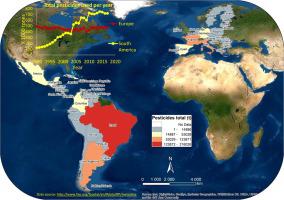Environment International ( IF 11.8 ) Pub Date : 2020-06-30 , DOI: 10.1016/j.envint.2020.105917 Zisis Vryzas 1 , Carmel Ramwell 2 , Carmen Sans 3

|
Assessment and management of issues related to pesticide residues, such as environmental fate, monitoring and toxicity, are complex and, in many cases, require costly studies. The early establishment of a priority list of pesticides that should be monitored and assigned to a restricted-use policy is an important issue of post-registration Risk Assessment (RA). Various pesticide registration approaches have been adopted by different countries with those from Europe and the USA being the most popular, constituting the major prototypes for registration approaches in other countries. Adoption of pesticide registration and monitoring systems developed in Europe or USA by Latin American and Caribbean countries may underestimate factors affecting the environmental fate and toxicity of pesticides in their own countries. Incentive for this short review was the activities undertaken during the three KNOWPEC workshops held in Costa Rica, Argentina and Bolivia where European pesticide experts met Latin American experience in the form of Costa Rica’s exceptional environmental conditions and ecology, Argentina’s and Uruguay’s soyisation and Bolivia’s contrasting climate and agricultural zones. During the parallel activities of the workshop - including scientific presentations, field trips, interviews and meetings among European partners and pesticide stakeholders in Latin America, - the whole pesticide chain (import-export, trade, application, plant protection-efficacy, residues, monitoring, remediation and risk) was studied and clarified. Recently-published chemical prioritization studies were reviewed to consider their use as a tool to support risk assessments. Differences in regional practices are highlighted as regards to the establishment of RA or prioritization strategy in European and Latin American regimes. General guidance of establishing a cost-effective pesticide monitoring scheme in water bodies of Latin America and the Caribbean (LAC) is also proposed. Moreover, we summarize the most important factors that should be taken into consideration for prioritization approaches and categorization used in pesticide environmental monitoring studies. Consideration of current RA approaches and limitations, and pesticide prioritization exercises highlighted in this Commentary could assist in the management of pesticides in Latin America and Caribbean.
中文翻译:

环境监测研究中的农药优先排序方法和局限性:从欧洲到拉丁美洲和加勒比地区。
与农药残留有关的问题的评估和管理,例如环境命运,监测和毒性,是复杂的,在许多情况下,需要进行昂贵的研究。尽早建立应监测并分配给限制使用政策的农药优先清单是注册后风险评估(RA)的重要问题。不同国家已经采用了各种农药注册方法,其中欧洲和美国的农药注册方法最为流行,构成了其他国家注册方法的主要原型。拉丁美洲和加勒比国家在欧洲或美国开发的农药注册和监测系统的采用可能会低估影响本国农药的环境命运和毒性的因素。这次简短回顾的动机是在哥斯达黎加,阿根廷和玻利维亚举行的三个KNOWPEC讲习班期间开展的活动,欧洲农药专家以哥斯达黎加的特殊环境条件和生态,阿根廷和乌拉圭的大豆化以及玻利维亚的气候形成鲜明对比的方式与拉丁美洲的经验相遇。和农业区。在讲习班的平行活动中-包括科学演讲,实地考察,欧洲合作伙伴和拉丁美洲农药利益相关者之间的访谈和会议-整个农药链(进出口,贸易,应用,植物保护效力,残留物,监测,修复和风险)进行了研究和澄清。审查了最近发布的化学优先研究,以将其用作支持风险评估的工具。关于在欧洲和拉丁美洲制度中建立RA或确定优先级策略方面,地区实践的差异得到了强调。还建议在拉丁美洲和加勒比水域(LAC)建立成本有效的农药监测计划的一般指导。此外,我们总结了农药环境监测研究中使用的优先方法和分类应考虑的最重要因素。考虑当前RA的方法和局限性,以及本评注中突出显示的农药优先级排序做法,可有助于拉丁美洲和加勒比地区的农药管理。还建议在拉丁美洲和加勒比水域(LAC)建立具有成本效益的农药监测计划的一般指南。此外,我们总结了农药环境监测研究中使用的优先方法和分类应考虑的最重要因素。考虑当前RA的方法和局限性,以及本评注中突出显示的农药优先级排序做法,可有助于拉丁美洲和加勒比地区的农药管理。还建议在拉丁美洲和加勒比水域(LAC)建立成本有效的农药监测计划的一般指导。此外,我们总结了农药环境监测研究中使用的优先方法和分类应考虑的最重要因素。考虑当前RA的方法和局限性,以及本评注中突出显示的农药优先级排序做法,可有助于拉丁美洲和加勒比地区的农药管理。我们总结了农药环境监测研究中使用的优先方法和分类应考虑的最重要因素。考虑当前RA的方法和局限性,以及本评注中突出显示的农药优先级排序做法,可有助于拉丁美洲和加勒比地区的农药管理。我们总结了农药环境监测研究中使用的优先方法和分类应考虑的最重要因素。考虑当前RA的方法和局限性,以及本评注中突出显示的农药优先级排序做法,可有助于拉丁美洲和加勒比地区的农药管理。


























 京公网安备 11010802027423号
京公网安备 11010802027423号